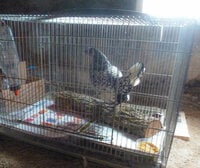- Thread starter
- #21
southernbound13
Chirping
- Apr 24, 2018
- 46
- 137
- 74
Interesting!! And the sire roo (and at the time the only roo on the place) is an orpington/leghorn that was one of the neighbors bachelors and decided he lived with us a few years back. The hen was a RIR. No crowing, no mounting and has tiny spur buds, about half the size of its brothersWhat are the possible crosses? Is the questionable chicken crowing? Mounting? Spurs compared to its hatch mates?
Just because this post made me think of another
https://www.backyardchickens.com/threads/does-she-have-poor-circulation.1288406/#post-20878192





